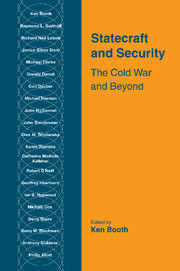Book contents
- Frontmatter
- Contents
- List of contributors
- Preface
- Introduction
- Part one Cold War: lessons and legacies
- 1 Cold Wars of the mind
- 2 Who is to blame for the Cold War?
- 3 Nuclear lessons of the Cold War
- 4 A Cold War life, and beyond
- Part two Post-Cold War: powers and policies
- Part three Beyond: resistances and reinventions
- Conclusion: security within global transformation?
- Index
1 - Cold Wars of the mind
Published online by Cambridge University Press: 06 October 2009
- Frontmatter
- Contents
- List of contributors
- Preface
- Introduction
- Part one Cold War: lessons and legacies
- 1 Cold Wars of the mind
- 2 Who is to blame for the Cold War?
- 3 Nuclear lessons of the Cold War
- 4 A Cold War life, and beyond
- Part two Post-Cold War: powers and policies
- Part three Beyond: resistances and reinventions
- Conclusion: security within global transformation?
- Index
Summary
The Cold War was the déja-là of the end of human civilisation. For nearly fifty years an international ‘system’ or ‘society’ which had become dysfunctional – explicitly MAD – daily practised the genocidal routines, and accepted the ethical and other implications involved in destroying (at the least) what passed for civilised life in the northern hemisphere. The horrifying scale and manner of the threatened slaughter was beyond the margins of the nightmares and fantasies of previous centuries. The infrastructure of this Armageddon, and its mindsets, have not been eliminated; they have only been pushed from the centre. The Cold War is not over. It exists as our living recent past, and it exerts a powerful presence by being both remembered and forgotten in complex ways. As a particular historical period the Cold War has come to an end, of course, but in various guises it continues as an important political reality.
Cold Wars
The Cold War is not over in two senses. It is not over because the experience, lessons, remembrances and forgettings of the four and a half decades after 1945 remain important political factors in international relations today, and it is not over because the Cold War of modern memory can be seen as an instance of a particular culture of global conflict which long predated recent history and which shows few signs of being dead. The Cold War is memory, mindset and prize.
The memory of the Cold War is a prize to struggle over.
- Type
- Chapter
- Information
- Statecraft and SecurityThe Cold War and Beyond, pp. 29 - 55Publisher: Cambridge University PressPrint publication year: 1998
- 6
- Cited by

